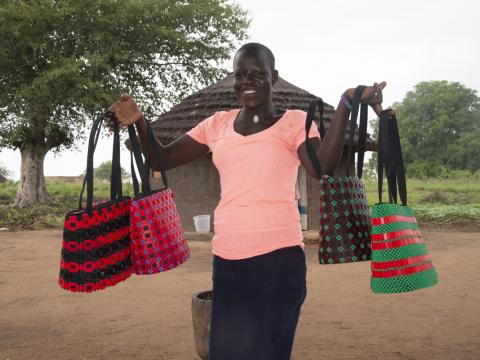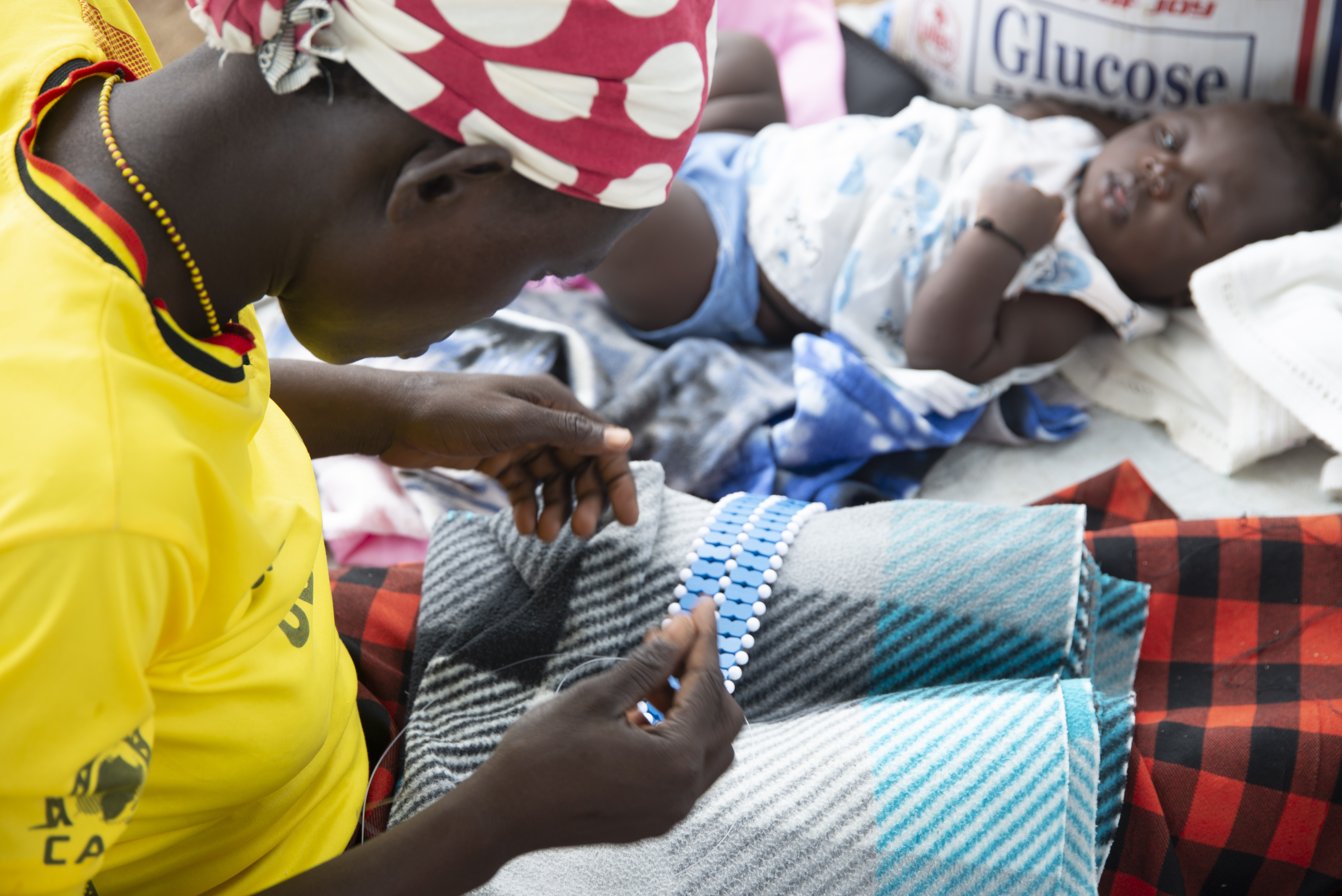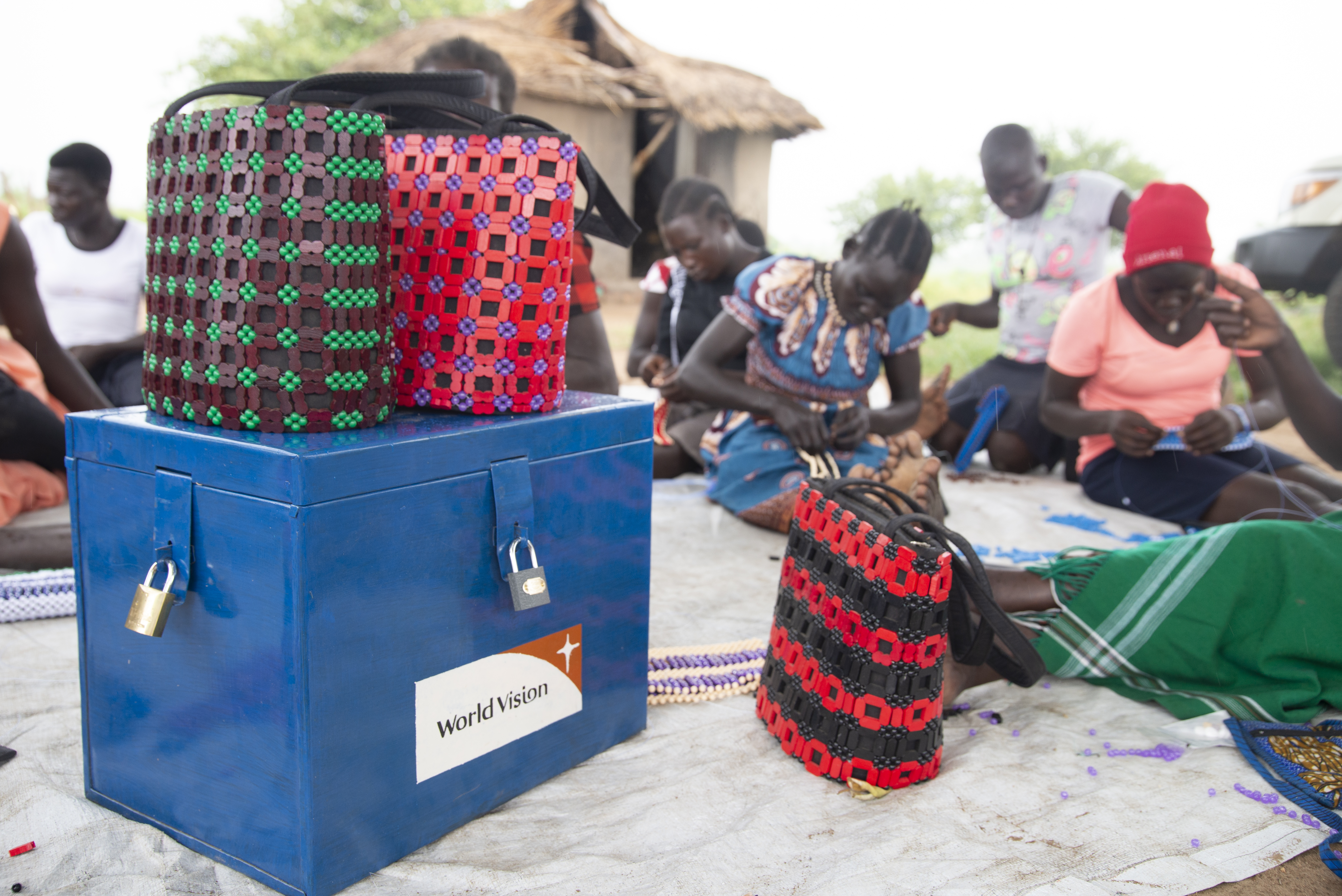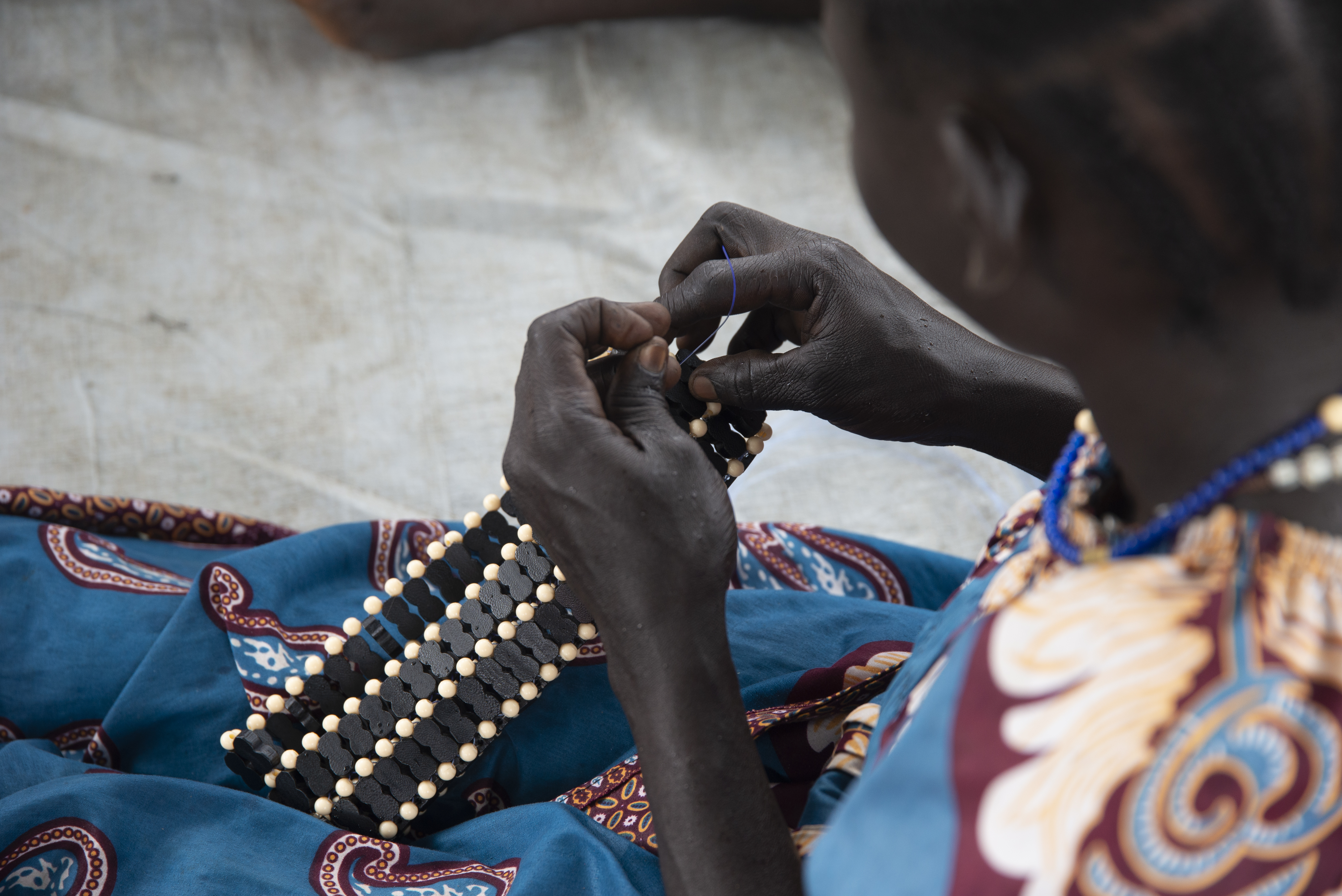Refugee women weaving brighter futures for their families

A mere thought of her journey from South Sudan to Uganda brings tears to her eyes, as 30-year-old Dominica cuddles her three-year old son—James. She soaks in more tears while reminiscing about the attack on her family during the war.
Dominica was 25 and a single parent when she fled South Sudan in 2016, seeking safety and economic opportunities for herself and her four children aged between five years and a month old. Like many others, Dominica left her home country in the wake of political unrest. Many women and men caught in the middle of conflict sought refuge in Uganda. With only their children in their arms, several women found a new home in the Maaji III Refugee Settlement in the West Nile district of Adjumani.
However, a new home wasn’t enough; Dominica and other refugee women needed income-generating options, as they became sole breadwinners for their families.
"When the war broke out, my children and I stayed in the bush for days with no food”, Dominica narrates. “Coming to such a peaceful environment is like a miracle. Now, all I needed was to acquire skills that would help me to earn a living, not only here in the settlement but also after I return home.”
With over 215,000 refugees, Adjumani district has the second-largest refugee population in Uganda because of its proximity to South Sudan. Sixty percent of these are women, and most of them don’t know if and when they would go back to their home country.
Research shows that working-age refugee women are less likely to be economically active, in comparison with both local women and refugee men, which increases the vulnerability of women in the refugee camps and particularly for female heads of households. Striving to ensure their families’ livelihoods, many of the economic activities that refugee women undertake are unstable and sometimes expose them to unexpected dangers such as sexual and gender-based violence.
Through the Mountain Blue Farms-funded West Nile Livelihoods Project, World Vision is providing a conducive environment for women refugees to gain skills for subsistence and income generation. The all-day, weeklong training has taught these refugee women the basics of making bags and basket weaving, and also empowered them to create marketable items that could lead to greater economic independence.

For the training, World Vision invited a master weaver to teach refugee women about the technique, using beads of different shapes and colours, as well as threads to craft beautiful bags. All of the refugee women who participated in this training made at least one basket by the end of the week.
“When I started learning basket weaving, I didn’t even know how to hold the needle; but now I am an expert!”, says Dominica, the chairperson of Tamama Women’s Group. “I am able to make bead bags and even weave baskets that I am proud of, and since I am earning money and contributing to the expenses at home, life is far better.”

Seated next to Dominica, is 25-year-old Joyce Foni, who came to Maaji III Refugee Settlement in August 2016 after her home was attacked by rebels in South Sudan. She walked for two days with her four children to the Ugandan border, where they were later transported to the settlement.
Joyce is a member of Tamama Women’s Group—an all women 30-member—to which Dominica belongs. The group meets twice a week to jointly make baskets. On other days of the week, younger group members like Joyce are tasked with taking the beautifully woven bags and baskets to different markets around the settlement. Joyce describes the skills she has gained from short-term training in bag making as transforming.
“After escaping South Sudan, my life is changing for the better", says Joyce. "Now, I am busy making bags with my women’s group and selling them at the market. Working together, and being able to sell these bags gives us a great opportunity to learn new things and to secure some financial stability.”
These two women have one thing in common. Despite being survivors of the South Sudan conflict, they have put their tragic tales aside to work and support each other in these difficult times. The future is promising. After only a few weeks of fulfilling orders placed by customers, the group has already earned over UGX3.4 million (US$2,000) in profit, with more expected as they continue to build contact and receive orders from back home in South Sudan.
West Nile Livelihoods Project Coordinator, Jesca Alanyo, says that despite the many initial challenges they face, refugee women have come a long way in many areas towards a brighter future. “One of the best parts about this programme is that it not only teaches women the craft skills needed for making bags and basket weaving, but it also connects them to a market for their works, and with each other for ongoing support and encouragement.”
Bag making and basket weaving are traditional crafts in this area and they is often a source of income for families. The training covered making of bags using beads, basket weaving, business and savings groups management and how to approach financial institutions as well as mindsets change.
“When we were starting, some women couldn’t read nor write”, Jesca shares. “Many couldn’t even speak in public. A few months down the road, these women have changed. They have acquired critical skills that they will use even after they leave the settlement and return home.”

These refugee women come from farming backgrounds, and like most rural African families are subsistence farmers. Moreover, an increase in drought has seen more women turning to the art of making bags and basket weaving as a sustainable source of income. Many savings groups make bags and weave together in community workshops where women are able to support and mentor one another.
“Being part of a women’s group that makes bags and weave baskets has given me more independence and many other benefits”, says Dominica. “Making bags or weaving baskets is work that can be taken with you virtually anywhere but it’s crucial for us to meet and listen to our own stories, celebrate our skills and achievements.”
While the craft-skills training programme is still in its infancy, there are plans to further support the refugee women in the areas of business development and commercial transactions and to expand the scope of the training to incorporate other crafts skills such as knitting and needlework.
In addition to expanding the scope, World Vision plans to partner with players in the tourism sector as a way for the refugee women participating in future training to showcase and sell their wares. “So far we’re impressed with the craft skills exhibited”, says Jesca. “We intend to engage people involved in tourism to have these beautiful items displayed for tourists and visitors. We can’t wait to expand this programme to incorporate more skills that will benefit not only the young women and their families, but the community.”
Walking through Maaji Refugee Settlement, one can't help but get a community feel that has been created to allow refugee women like Dominica and Joyce to experience a network of support and to provide them with the courage to become a part of the sensitive dialogue that often surrounds gender issues.
“Back home, I relied on my husband for everything we needed at home”, says Dominica. “Too many times, I couldn’t even ask him for money for a new pair of shoes because there were just many more important things that were more pressing and needed to be prioritised. But since I started weaving, life has changed.”
The key achievement of the project, thanks to the generosity of the Australian people, is the financial independence it has given the women refugees; weaving a more gender-equal future for their children. Involving refugee women like Dominica and Betty in craft-skills training and savings group dynamics has added value. Many have gained a sense of normalcy in life and overcome the trauma of displacement. By obtaining new skills and knowledge, refugee women are training for the day when they will go back home and overcome change agents in their communities. For now, they can put food on the table, educate their children, and build decent houses. Family members and the community appreciate their business as it supports many women and children.
-
Story: Fred Ouma - Development Communications Coordinator, World Vision, Uganda. Photos: Brian Jakisa Mungu - MEAL Assistant, World Vision, Uganda